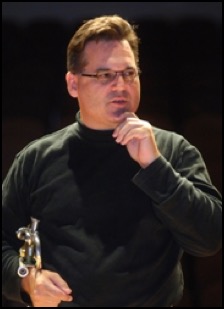Michael Sachs
The Art of Learning
27/06/15 Filed in: Review

His book, The Art of Learning, offers solid advice on the fundamentals of efficient learning illustrated with entertaining personal anecdotes. The strength of the book is this combination of advice and illustration. I am sure that while living through the events depicted the path was not always as clear as he makes it sound, yet he has laid out an approach one can imagine following.
The book presents an approach that could be applied to any field where excellence is a goal. This is, of course, why a book drawing examples from Tai Chi Chuan and chess is of value to a musician. One can't help but wish for a companion work book that applied these techniques in a concrete manner, however, there are books that can fill the gap, and, for trumpeters, I recommend diving into Daily Fundamentals for the Trumpet by Michael Sachs with the Waitzkin approach in mind.
Usually a book of fundamentals is a collection of exercises that expose basic techniques to scrutiny. There is some of that here, but Mr. Sachs focuses on extracting fundamental exercises from whatever music you are studying. As an example. he delves deeply into the opening of the Trumpet Concerto by Joseph Haydn exposing the fundamental structure of the passage in a manner one could imagine Mr. Waitzkin using.
From The Art of Learning
"The key to pursuing excellence is to embrace an organic, long-term learning process, and not to live in a state of static, safe mediocrity." --page 33
"While I learned with open pores--no ego in the way--it seemed that many other students were frozen in place, repeating their errors over and over, unable to improve because of a fear of releasing old habits." --page 107-108.
"I have long believed that if a student of virtually any discipline could avoid ever repeating the same mistake twice--both technical and psychological--he or she would skyrocket to the top of their field." --page 108
". . .my vision of the road to mastery--you start with the fundamentals, get a solid foundation fueled by understanding the principles of your discipline, then you expand and refine your repertoire, guided by your individual predispositions, while keeping in touch, however abstractly, with what you feel to be the essential core of the art. What results is a deeply internalized, interconnected knowledge that expands from a central personal locus point." --page 138-139
"I started practicing. First I worked on each step slowly, over and over, refining my timing and precision. Then I put the whole thing together, repeating the movements hundreds, eventually thousands of times." --page 145
"Too many of us live without fully engaging our minds, waiting for that moment when our real lives begin. Years pass in boredom, but that is okay because when our true love comes around , or we discover our real calling, we will begin. Of course the sad truth is that if we are not present to the moment, our true love could come and go and we wouldn't even notice." --page 187
